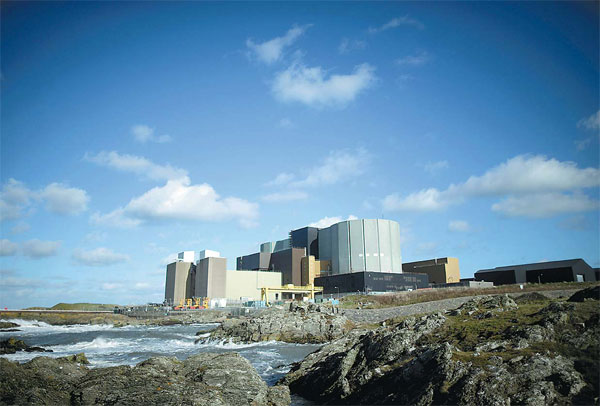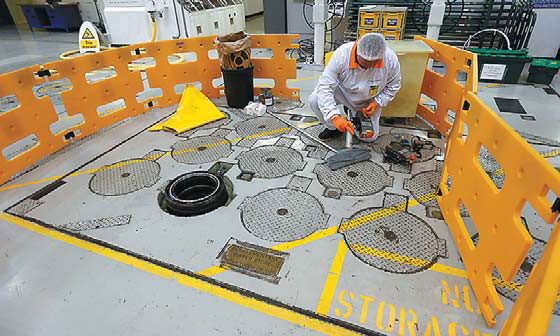Investment tap is turned full on
Updated: 2014-10-31 14:10
By Cecily Liu(China Daily Europe)
|
|||||||||||
China could help close the expected infrastructure gap, but issues need to be resolved along the way
China is set to invest big money in British infrastructure by 2025 across sectors including energy, property and transport, but great challenges still need to be addressed to ensure results, according to a research report.
The UK's National Infrastructure Plan has underestimated the country's needs, but the shortfall could be filled by China, according to a new report from the Pinsent Masons international law firm and the Centre for Economics and Business Research.
The amount China is forecast to invest is 105 billion pounds ($170 billion; 133 billion euros) by 2025.
A significant amount of Chinese investment has already been channeled into UK infrastructure in the past few years.
In 2012, China Investment Corp, the country's sovereign wealth fund, bought a 8.68 percent stake in Thames Water Utilities Ltd and a 10 percent stake in Heathrow Airport Holdings, the company that runs London's Heathrow Airport. In 2011, China's Cheung Kong Infrastructure Holdings bought the UK utility company Northumbrian Water for 2.4 billion pounds.
In addition to these financial commitments, a smaller number of Chinese investors have recently become involved in the operation and management of infrastructure projects.
One recent high-profile project with Chinese participation in Manchester has been Beijing Construction Engineering Group's role in the 800 million pound Airport City Manchester office and industrial park.
BCEG will share half the project's construction workload, along with the British construction company Carillion. BCEG will also help market the project in China in an effort to get more Chinese companies to locate their European headquarters at Airport City Manchester.
But this is only the beginning of a potentially large number of similar Chinese investments.
The National Infrastructure Plan drawn up by the UK government identified close to 400 billion pounds of spending needed between now and 2020, but the new report has identified real infrastructure needs of the UK to be closer to 500 billion pounds.
Despite the need, significant challenges exist, both in Chinese companies' ability to navigate complex legal frameworks relating to infrastructure in the UK, and the UK government's commitment to make such opportunities financially viable for investors, says Richard Laudy, head of infrastructure at Pinsent Masons.
Laudy says the regulatory complexity lies in the requirement for bidding companies to supply a large amount of information in a timely manner, and in a structured format.
"I think the challenge is understanding how the process works. Challenges range from labor market regulations to the planning process and how to operate within the framework of EU regulations," Laudy says.
In addition, the UK's infrastructure projects are mainly bid competitively, meaning each company or consortium submits a separate application. This is very different from other markets that take applications on a single tender basis, meaning Chinese investors can directly negotiate with the respective government about the bid, Laudy says.
It is helpful for Chinese companies to master the skills needed to navigate within the UK regulatory framework by bidding for projects in partnership with UK or European companies more familiar with the process, he says.
He says BCEG's partnership with Carillion is a good example of this, and in the future he would expect Chinese companies to do the same when investing in energy, roads and rail projects.
Another challenge is the question of how projects will be financed in the long term, given that Chinese investors will look for assurances of a return on their investment.
Laudy says there is no simple answer for UK projects' long-term funding. Such commitments are difficult for the UK government given that Britain's economy is just coming out of recession.
"I don't think the UK government has the funding available because it is paying back the deficit. If long-term funding for infrastructure projects is not committed by the government, the UK may attract less foreign investment."
Two sectors Chinese investors are keen on are nuclear power and high-speed rail. Given that these are strategically important, Chinese companies want to demonstrate their strengths in Britain before exploring expansion into the rest of Europe.
Chinese nuclear companies have had an interest in the UK for several years. In 2012, two Chinese companies formed consortiums with partners to bid for the UK's Horizon nuclear programs but withdrew before the bidding process finished.
But the interest did not end there. Two Chinese nuclear power companies have reached an agreement to invest in the UK's first nuclear power stations in two decades, a milestone expected to demonstrate the strength of the Chinese nuclear industry in Western countries.
The two planned reactors are at Hinkley Point C, in Somerset. Led by EDF Group of France, they would cost 14 billion pounds, and are due to start operating in 2023 if built on time. They would run for 35 years.
China General Nuclear Power Group and China National Nuclear Corporation are expected to have a combined 30 to 40 percent stake in the consortium, with French multinational energy group Areva taking another 10 percent.
Exact plans for cooperation at Hinkley Point C are expected after a European Commission decision on UK state aid for the project is made.
Unlike nuclear, the UK's high-speed railway sector has not demonstrated immediate openings for Chinese investment. London is still determining the structure of funding for the project, but potential opportunities for Chinese investment exist, Laudy says.
Known as High Speed 2, the British high-speed railway is planned to link London with the English Midlands and cities in North England. Construction of phase one of the project is set to begin in 2017 with an expected opening date of 2026.
Laudy says Chinese companies have a big advantage because both public and private Chinese investors have strong financing capabilities to support the projects.
Chinese investors' experience in infrastructure projects has given them the ability to take more risks, which is helpful for large projects involving significant investment and long- term returns.
"Chinese investors are historically happy to take risks at early stages, linked to their historical strength in engineering and manufacturing," Laudy says.
Many other investors, in contrast, are wary of building new projects because it is not until the projects are up and running that they get a return, he says. So they prefer to wait until a project is built and invest at the operational phrase.
Zhou Xiaoming, minister counselor with the economic and commercial office at the Chinese embassy in London, says Chinese companies have great skills and expertise to share.
"With nuclear power and high-speed railways, China's technology and experience is abundant. For China to take part in these projects in the UK would prove to other Western countries China's strength in both fields.
"China's expertise in such projects is building them quickly, all the while maintaining quality, which is important for projects where lengthy construction times would require a lot more investment."
In the nuclear industry, for example, construction of Britain's most recent nuclear power station, Sizewell-B, began in 1987 and it was commissioned in 1995, almost 20 years ago.
"This means Britain has lost the project management skills for nuclear projects, but China can bring this experience as the country has constantly been working on nuclear projects in recent years," Zhou says.
London has welcomed Chinese infrastructure investments, and so have local governments that have been keen on publicizing local opportunities.
A delegation of Manchester business representatives recently launched an investment portfolio in Beijing to tout opportunities they have for Chinese participation in many infrastructure projects.
Among them: Ocean Gateway, a strategic corridor stretching 64 kilometers from Manchester along the Ship Canal to Liverpool, and another is NOMA, a 10-year mixed-use redevelopment scheme.
Apart from the huge Manchester Airport City projects, there also is MediaCityUK, which touts itself as the largest purpose-built creative and digital hub in the UK, which still is open to new occupants.
Laudy says the flow of Chinese investment into Britain has only just started, and more deals are expected in the form of joint ventures and strategic alliances.
"Four out of five of the world's largest construction and engineering companies are now Chinese, with a growing appetite for infrastructure investment and with the potential to invest vast amounts of capital in advanced economies in Europe," he says.
cecily.liu@chinadaily.com.cn
|
A general view of the Wylfa nuclear power station in Tregele, Anglesey, UK. The project has Chinese investment. Photos Provided to China Daily |
|
An environmental safety monitor carries out contamination checks in the charge hall inside EDF Energy's Hinkley Point B nuclear power station in Bridgwater, southwest England. Photos Provided to China Daily |
(China Daily European Weekly 10/31/2014 page23)
Today's Top News
Trilateral talks on Ukraine gas reaches agreement: EU
Culture ministry: no politics, no propaganda, only China
World Bank pledges $100m more to fight Ebola outbreak
Canadian PM to attend APEC
Russia 'willing' to co-op with Ukrainian parliament
China to help build Ebola quarantine center in Liberia
Tycoons' gift to Yale stirs debate
180 'foxes' hunted back to China
Hot Topics
Lunar probe , China growth forecasts, Emission rules get tougher, China seen through 'colored lens', International board,
Editor's Picks

|

|

|

|

|

|







